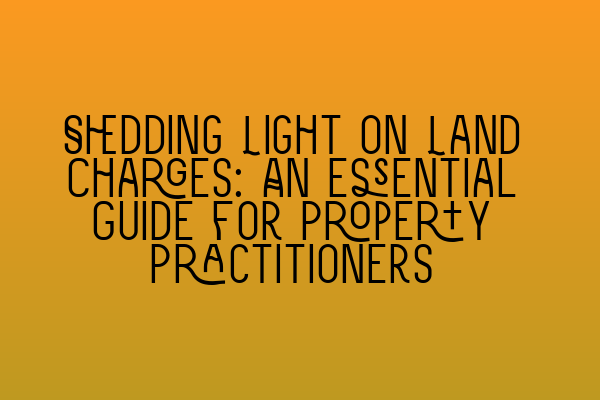Shedding Light on Land Charges: An Essential Guide for Property Practitioners
As a property practitioner, you deal with a wide range of legal matters involving real estate. One crucial aspect of your work is understanding land charges and their significance in property transactions. In this comprehensive guide, we will shed light on the intricacies of land charges, providing you with essential knowledge that will help you navigate this complex area of property law.
What Are Land Charges?
Land charges refer to rights or interests in land that are registered with the Land Charges Department of HM Land Registry. These charges can affect the ownership or use of a property, and it is vital for property practitioners to identify and understand them when dealing with property transactions.
Types of Land Charges
There are various types of land charges, each with its specific implications. Here is a list of some of the most common land charges you may come across in your practice:
- 1. Class C (iv) land charges: These charges include restrictive covenants and equitable charges that may affect the use or transfer of the property. It is crucial to assess the impact of these charges on your client’s property rights.
- 2. Class C (ii) land charges: These charges relate to local land charges, such as planning permissions, tree preservation orders, and conservation area restrictions. Compliance with these charges is essential to ensure your client’s property meets all the necessary legal requirements.
- 3. Class D land charges: These charges denote bankruptcy and insolvency proceedings against a property owner. It is crucial to investigate these charges to assess any financial risks associated with the property.
- 4. Class F land charges: These charges pertain to the rights of landowners affected by development schemes, such as road and railway projects. Understanding the implications of these charges is vital, especially when considering the potential impact on the property value and usage.
These are just a few examples of the numerous land charges that may be present in property transactions. By familiarizing yourself with these charges, you can protect your client’s interests and ensure compliance with legal obligations.
Conducting Searches and Enquiries
When dealing with property transactions, it is crucial to conduct thorough searches and enquiries to identify any land charges that may affect the property. These searches should be carried out with the utmost care and attention to detail to avoid any oversights or misunderstandings.
To complete an accurate search, you should utilize the resources available to property practitioners, such as online databases and official registers. These tools provide access to comprehensive information about land charges, enabling you to assess their implications effectively.
Additionally, it is essential to make appropriate enquiries to relevant authorities, such as local councils or the Land Registry, to gather all the necessary information about any potential land charges. Asking the right questions and seeking clarification when needed will ensure that you have a complete picture of the property’s legal status.
The Importance of Land Charges in Property Transactions
Understanding land charges is crucial for property practitioners because they can significantly impact a property’s value, usage, and transferability. Failure to identify and address these charges adequately can lead to costly legal disputes or financial repercussions in the future.
By carefully reviewing all land charges associated with a property, you can determine the risks involved and advise your client accordingly. This information allows you to negotiate and draft contracts that safeguard your client’s interests, ensuring a smooth and legally compliant property transaction.
Conclusion
As a property practitioner, having a comprehensive understanding of land charges is essential to providing expert advice and effectively representing your clients. By recognizing the various types of land charges and conducting thorough searches and enquiries, you can navigate the intricacies of property transactions with confidence and professionalism.
At SQE Property Law & Land Law, we offer SQE 1 and SQE 2 preparation courses to equip aspiring solicitors with the necessary skills to excel in their legal careers. Our SQE 1 Practice Exam Questions and SQE 1 Practice Mocks FLK1 FLK2 will help you enhance your knowledge and test your understanding of property law. Visit our website to explore our range of SQE 2 Preparation Courses and SQE 1 Preparation Courses to prepare yourself for the SRA SQE exams. Stay updated with the latest SRA SQE Exam Dates and start your journey towards becoming a successful property practitioner today!
